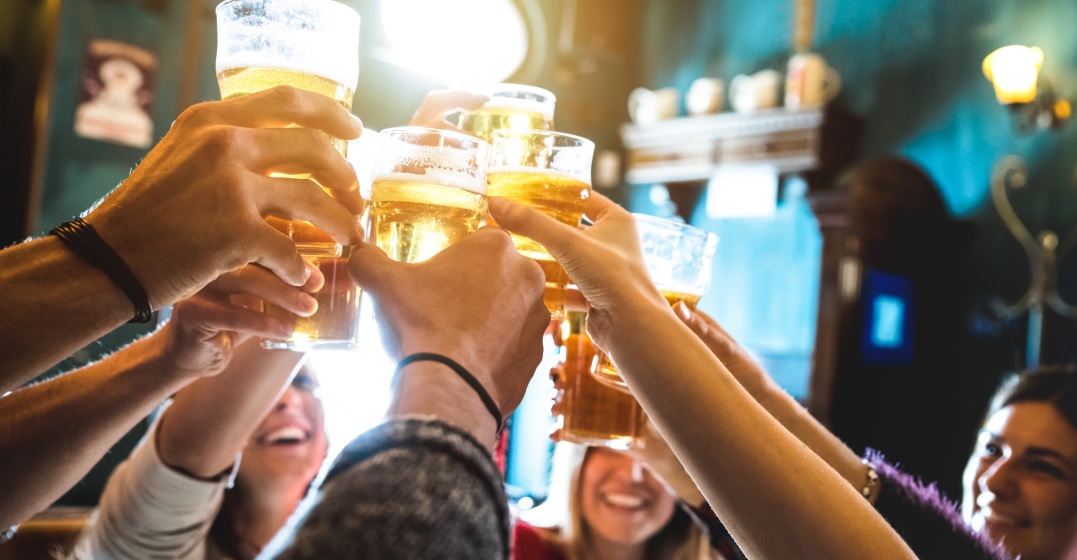Published on October 6, 2023

4 ways to say “cheers” in German

Whether you’re meeting friends at a Biergarten or raising a glass of Riesling to celebrate a special moment, there’s always a reason to toast. Indeed, clinking glasses has long been considered an important means to guarantee the health and happiness of those gathered. But in order to say “cheers” in German, you will need to learn some new words and etiquette. Yes, that’s right. There are rules about how to drink in company — and consequences for those who don’t comply.
Did you know that sitting down for a beer with Germans can earn you seven years of bad luck, especially in the bedroom? We don’t mean to frighten you with superstition, but before you indulge in the liquid bread (flüssig Brot) that contributes so essentially to Germany’s fame, try to remember these rules for clinking glasses.
If you don’t want to worry about your sex life, this is the most important rule. Not making eye contact is one of the big don’ts in German culture. Look at your drinking partner, raise and clink your glasses, say “cheers” and drink. If you’re drinking wine, look again. Confused? Let’s walk through the details. For now, just make a mental note to look everyone in the eye when toasting — always!
If you’re having a beer with friends, the standard custom is to make eye contact, clink, say “cheers” and take a sip or two. Unless you are drinking a Weissbier. Then it’s eye contact, clink and cheers, set your beer down and drink. The extra step serves to shake up the yeast in the beer.
Drinking wine is a more sophisticated affair. Make eye contact, raise your glass, slightly nod your head and say “cheers,” take a sip and make eye contact again. Clinking is reserved for romantic dinners and celebrations.
The etiquette for drinking champagne and sparkling wine isn’t always clear, but the consensus seems to be: Do whatever you like. You can raise your glass or clink glasses with one person or a whole group. New Year’s Eve is an ideal time for practice!
Important note: Beer glasses are clinked at the bottom, wine glasses in the middle (hold them at the stem or on the lower third of the body) and champagne glasses close to the rim. Try not to break your glass! Other than that, just enjoy yourself. Socializing over a drink is a fun way to learn a new language. Brush up on your German basics and get started.
Though etiquette may be changing with the times, the traditional rule states that you should not clink glasses with anything but beer, wine or sparkling wine. You should especially not do so with water!
The origins of raising a glass go back to pagan times, when people drank to the gods. Later on, they drank to their kings and nobles, and sometimes even to their friends. These days, raising a glass typically just means that you are wishing your co-drinkers good health.
Now that you know what to do, let’s learn how to say “cheers” in German — including how to pronounce all the different variations.
Prost in German comes from the Latin prosit, which means “may it be good” or “may it be beneficial.” The contraction Prost goes back to German student life in the early 18th century. And here is how to pronounce it: Prost! Fun fact: You can also say Prost Mahlzeit! to start a meal.
Prosit is the full Latin form. It is more sophisticated than Prost and is mostly used when drinking wine, champagne or sparkling wine. It’s kind of a fancy way to say, “To your health!” And here is how it should sound: Prosit! Practice well so you can join in singing “Ein Prosit der Gemütlichkeit” during the next Oktoberfest.
Zum Wohl is one of the possible translations of Prosit/Prost. If you always opt for this German form of “cheers,” you can easily practice the pronunciation of the German z and w. The word Wohl is also a good example of the silent h. What better way of studying German could you imagine? So, get yourself a glass of beer and listen to the correct pronunciation of Zum Wohl!
The great thing about Latin is that you can translate one word with a variety of German words. So, if you don’t remember Zum Wohl, you can always say Auf die Gesundheit, which is not necessarily easier to pronounce.
The more you drink, the happier you get, and a simple Prost might not do justice to the excitement of the evening. This is where funny toasts come in. Here are some examples:
Drinking in Germany is not just about downing your drink or getting drunk as quickly as possible. It is part of German culture and comes with a set of rules and a special vocabulary. You now know how to clink glasses, how to say and pronounce “cheers” in German, and even how to demonstrate proficiency with a witty toast. Now it’s time to practice. Prost!